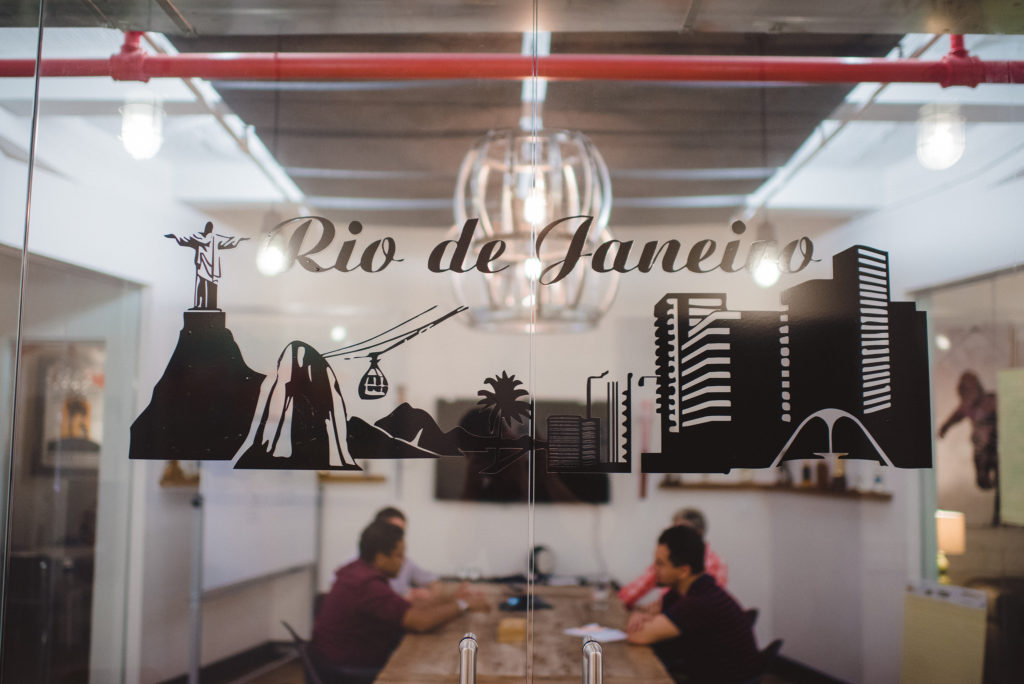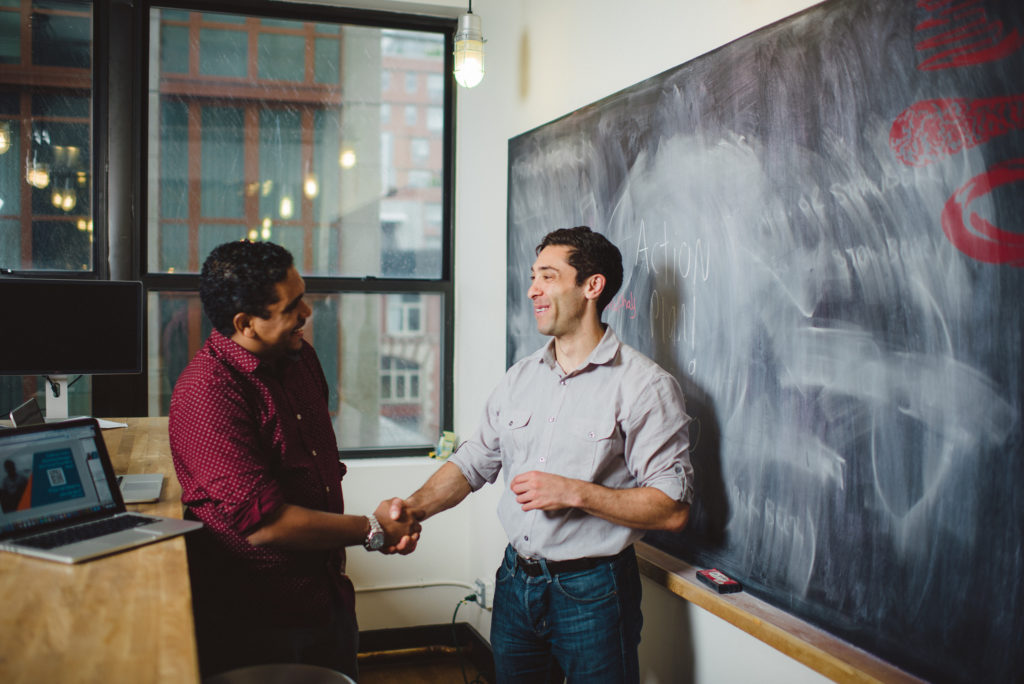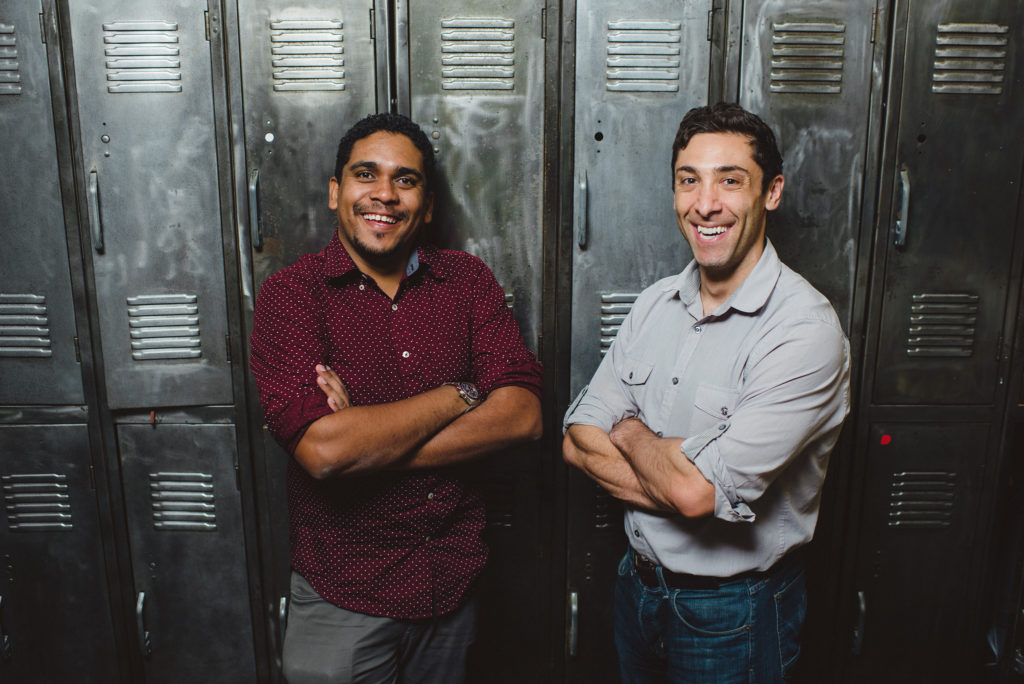Friendship blossoms between Brazilian and GlideSlope mentor
By Brian Canever, Center for Sport, Peace, & Society August 09, 2016In the hustle and bustle of America’s largest city, GlideSlope’s office space sits in a normal building on a normal New York City street. From the outside, the small sports strategy company doesn’t look like the kind of company that works with the country’s biggest brands, from Citi Bank to McDonald’s, to impact the world of international sport. But, the large Brazilian flag, and the “Rio de Janeiro” sticker emblazoned on the conference room’s glass door, signal the work done in the lead up to the Rio Olympic Games, where much of the team is spending the month of August.
Ian Cropp, a manager of sports strategy, and his GlideSlope team are specialists in putting together comprehensive plans for brands that include strategy, insights, analytics, and operational architecture so they can maximize the impact of their work during mega events like the Olympics. On top of its corporate work, GlideSlope also advises non-profits on how they can market themselves more effectively and create partnerships with sponsors.

The conference room door at GlideSlope
The timing, thus, was perfect to host a Brazilian emerging leader from one of Rio’s growing non-profits during the inaugural GSMP: Sport for Community program. Anderson Gama, marketing manager for Obra Social Dona Meca, and Ian became fast friends and together developed A Real Legacy: Sport as a Tool of Integration for Children with Disabilities, a plan for how Anderson will maximize the impact OSDM makes in the lives of children with disabilities through sport.
“Over three weeks, I saw Anderson’s passion, his hard work, and his talent on display,” Ian said. “He is wise beyond his years and his smile and energy are infectious. He’s really discovered he has this powerful ability to lead that he will only continue to unlock after the program.”
For his part, Anderson felt the same. “Ian is my big brother,” he said. “Every time that I need him he’s only a phone call away. Ian learns with you, he listens, and he wants to deliver.”
OSDM serves more than 250 kids in Rio’s Taquara neighborhood through a wide range of programs, including seven organized sports—swimming, futsal, basketball, volleyball, Capoeira, dance, and table tennis. But Anderson and Ian believe that number can be drastically increased, especially with the Olympic and Paralympic Games taking place in Brazil through late summer.

Anderson and Ian share a handshake while discussing Action Plan ideas
“Living and working in a host country for the Olympic/Paralympic Games really affords people a once-in-a-lifetime opportunity to foment change,” Ian said. “We look at the legacy of the London Paralympics to explain to the British public what disability sport is and why inclusion is important. This is an opportunity for storytelling and for grassroots organizations like Obra Social Dona Meca to get more attention for the phenomenal work they do every day.”
Anderson, who joined OSDM as an intern in 2013, never thought he would buy into the vision with such conviction. As a marketer, he expected to work in the corporate world. But working with the children reminded him of a time when he was a young man with asthma problems and how swimming changed his life and made him feel normal. After three years, he is more sensitive now to issues with accessibility and inclusion in his city and country than ever before.
For their one-year goal, Anderson plans to take advantage of the surge in sports popularity from the mega events to reach more than 5,000 children, as well as to train 300 teachers in upwards of 10 public schools on how to work with children with disabilities. A key part of the detailed Action Plan he developed with Ian is for OSDM to collaborate more regularly with schools throughout Rio and to advocate for improved accessibility of public spaces.
“This is the perfect opportunity to show kids in Brazil they can truly achieve more and that disability is not a barrier—that they can accomplish amazing things in life!” Anderson said. “The Paralympics will be a mirror to show the amazing work Obra Social Dona Meca does everyday. In five or 10 years, we can have a more equal society because of the Games.”

Anderson and Ian, who have become fast friends, pose together
Ian believes that sport is a natural equalizer, breaking down color and gender barriers and driving social and cultural change in the United States. Through this shared language, Anderson and his organization can break down the barriers between the disabled and non-disabled communities in Brazil.
“Companies and countries come and go, but sport is constant from the streets all the way up to the World Cup Final,” Ian said. “It doesn’t matter if it’s two strangers hugging at a soccer match halfway around the world or celebrating a Little League home run together.”
For Anderson, equality is a personal mission. He experienced sport’s power to level the playing field personally and sees its fruit every day in the smiles of the hundreds of children who walk through OSDM’s doors to kick a ball or shoot a basket. And he doesn’t plan on giving up until people of all abilities feel like Rio is as welcoming to them as to the next person.
“I want my legacy to be an equal society where people don’t have to worry about whether the elevator is working, whether there will be ramps for their wheelchairs, and where teachers are trained to work with children who have disabilities,” Anderson said. “Only then will we have a better society for the next generation. The children are our future and we must act now.”
View more photos from our visit to GlideSlope to see Anderson and Ian on Facebook (link)
